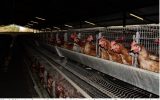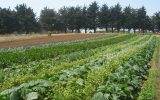Potatoes remain the most consumed staple food in Namibia; followed by onions, tomatoes and carrots. This was revealed by the Namibian Agronomic Board (NAB), during their media familiarization and networking event that was hosted around month end in March. During the event, the Namibian Agronomic Board (NAB) invited different media houses, which they updated and enlighten of the status quo of the crop industry in Namibia.
The NAB has revealed that despite their interventions to promote the agronomic industry and facilitate production of horticultural products, the country still continues to import grains, vegetables and fruits. During the media briefing; Emilie Abraham, NAB`s Manager for Horticulture Market Development, revealed that although there has been an increasing number of producers, Namibia still remains a net importer of horticultural products.
According to Emilie, about 96% of fruits are imported and only 4% of fruits are produced locally. Emilie further revealed that during the 2018/2019 financial year, the local demand for horticultural products was about 89 082 tons, with a monetary value of N$ 657 million. From this 89 082 tons that was locally demanded, only 35% was produced locally, while the entire 65% was imported.
Venaune Hepute, a researcher for the Namibian Agronomic Board (NAB) also made a presentation based on the NAB research and policy development sub-division. He outlined that their research development division do plays a critical role in the development of agronomy and horticulture industry by fostering innovation, productivity and efficiency in agriculture.
Venaune further added that their research division strives to be a model of excellence in research and policy recommendations in the agronomy and horticulture sector. Some of the current research and related activities carried out by the NAB through their research and policy development division includes; market intelligence study on pearl millet & wheat, experimental seed trials on pearl millet, white maize and wheat. The research division has also conducted research on experimental trials on improved potato seed varieties and a study on local grain production cost analysis.
The NAB has revealed that the MSP scheme implemented (minimum requirement for importers), currently stands at 47% from merely 5% in 2005. Furthermore, the NAB intends to continue supporting and promoting the agronomic industry through interventions such as; the registration of producers and traders, import restriction on special controlled products implemented during times of sufficient local supply and import restrictions on value added horticultural products.
In their final remarks, the NAB has indicated that although there are challenges in the agronomic sector, they should not blindfold us from seeing the opportunities that are also existing there. Some of the challenges includes; change in weather patterns, scarcity of planting materials for some crops and storage facilities. However, the opportunities also stands clear and some includes; more increased primary production (agronomic and horticultural products), agro processing/value addition, export markets and storage for surplus grain and veggies.




















